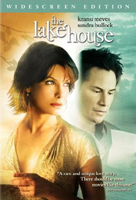 BUY IT AT AMAZON: CLICK HERE!
BUY IT AT AMAZON: CLICK HERE!
STUDIO: Warner Bros.
MSRP: $28.98
RATED: PG
RUNNING TIME: 98 min.
SPECIAL FEATURES:
• Additional Scenes
• Trailer
The Pitch
"It’s Sleepless in
The Humans
Keanu Reeves, Sandra Bullock, Christopher Plummer, a house.
The Nutshell
Here’s a neat distinction that one of my writer friends once gave me: the "story" is what happens in a film (or a novel, or whatever); the "plot" is how that story is presented to the audience. So… the plot of The Lake House goes a little something like this.
Doctor Kate (Bullock) moves into
The two timelines run along, perpendicular to each other, as our heroes make whatever stretches and feints they can into another time and another place with the hope of snatching love out of the space-time continuum.
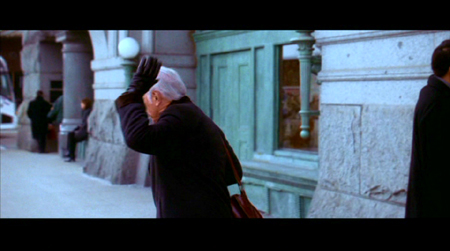
Christopher Plummer has no use for you or me.
The Lowdown
First off: don’t try and mess too much with the theory of time travel put forth in The Lake House. It’s just not worth the unraveling. Divergent timelines are created by actions performed in the past, as well as in the future, and the script is tight enough that the knots created by such manipulations are hardly even visible. Time travel is a device, here, not a plot element; it’s a magical realism technique, which means you’ll get no geek points from a viewing. You may get boyfriend/husband points, though, if you can keep your mouth shut.
No, the time travel isn’t anything more than that staple of romantic comedies/light dramas, the artificial means of keeping our protagonists apart. Love has to triumph over something, right? This time, it’s a dimensional rift in the form of a mailbox, through which our heroes exchange letters.
It does allow for some clever twists on the standard romantic pathos in the script. My favorite sequence in the whole movie (which also happens to feature some incredibly awkward acting on Reeves’ part) has Alex interacting with Kate at a party in his timeline, so he’s fully aware of their relationship, but she’s clueless. The screenplay, by Pulitzer Prize-winner David Auburn, is decent in form, balancing the two characters’ respective lives, but lacks quite a bit in the realm of characterization. This is most evident in the twin sub-plots that the lovers get in their respective timelines. Alex tries to reconcile with his father, and Kate tries to discern her feelings regarding a once and future lover. Attempts are made to tie these subplots into the love story, via metaphor and direct reference, but none of the links are solid.
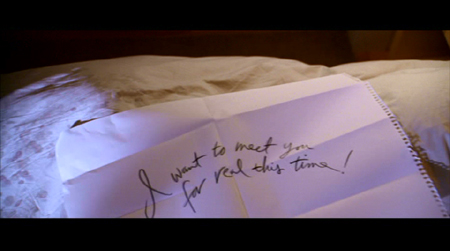
Will the obvious joke be lost in time?
It’s too bad, because it would have represented an interesting philosophical approach to the love story. The though mis-communicated is that to have a vital relationship, each member must have a separate and important life. A relationship isn’t an entity, but a partnership between two distinct individuals. I’m extrapolating quite a bit, because what the movie actually manages to tell the audience is that life alone is empty, and you’re not whole without a love in front of you.
It’s those routs into Trite-land which grate the most. The structure of this beast is such that it naturally provides an unusual perspective on the standard
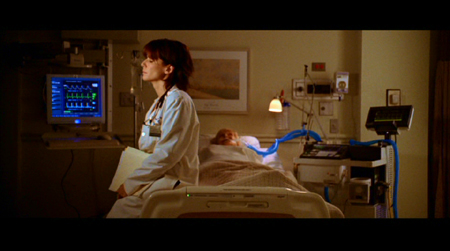
Graveyards and hospitals: at neither one will anyone listen to you.
It’s the last bit which raises my hackles. Forced happy endings break the fiction, and are pet peeves of mine. For ninety minutes, the audience makes every effort to treat the imaginary characters as real ones, and then, just as life begins to unfold and disbelief has just about evaporated, the filmmakers step in the close the book, tell you it’s time to go to bed. Someday a film will inspire me to write a full rant on the unnecessary happy ending. The Lake House isn’t that film, but you can rest assured that any motions toward satisfying character resolution you detect in the plot won’t matter in the final estimation.
As a final thumbtack in the coffin, The Lake House doesn’t speak well to its intended audience, either. That’s largely because Bullock and Reeves, possessing only a small measure of chemistry naturally, are kept physically apart for all but a few short sequences. Their relationship is forced to grow through awkward voice-overs, which are edited so as to remove most of their emotional anchorage.
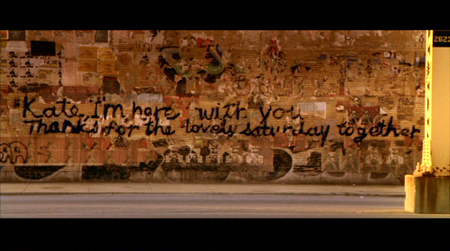
help help i am stuck in a spraypaint factory
The Lake House takes a simple question — can love survive the test of time? — and stretches it beyond its intention. It sparkles from time to time with plot creativity, but, sadly, the story isn’t much of one worth telling.
Oh, and it also suffers from the god-damned "reference great works of literature to appear intellectual, but in fact remind audience members that there are better things they could be spending their time on" syndrome. Will you people cut that out, please? If you’re emulating a classic story, don’t go out of your way to tell us that yours is the lesser product.
The Package
Nothing of note. Some outtakes and cutting-room detritus. The film’s nod toward dual-color schemes comes across beautifully in the transfer. The soundtrack features some great music, including an opening track by The Clientele, and an oddly-placed Nick Drake track or two.
5.9 out of 10